
Related
Topics
We end today’s broadcast in the Gulf Coast as the worst oil spill in US history is in its seventy-fourth day. On this holiday weekend, with families across the country celebrating July 4th, our thoughts are in Louisiana, where we broadcast several weeks ago. We visit Grand Isle, a community devastated by the oil spill. [includes rush transcript]
Transcript
AMY GOODMAN: We end today in the Gulf Coast as the worst oil spill in US history is in its seventy-fourth day. On this holiday weekend, with families across the country celebrating July 4th, our thoughts are in Louisiana, where we broadcast several weeks ago. One of the places we visited was Grand Isle, a community devastated by the oil spill.
AMY GOODMAN: We’re on Grand Isle Beach, the place where people come to around the country and around the globe, beautiful beaches, now covered in little globules of oil. And this is after the cleanup. It’s right around sunset. And if you look out to the horizon, well, that’s not the Deepwater Horizon, because that exploded on April 20th. But you can see the horizon is dotted with deep sea offshore drilling wells.
It doesn’t look so dramatic here, what has happened. It’s what’s invisible. Katrina, everyone saw. Hurricane Rita, everyone knew the houses were toppled. But here, everyone is aware that they don’t even know what the poison is in the water, but they know they have to stay away. Both the oil that’s killing the fish, the birds, could hurt people, and also the dispersants. Not even the company, supposedly, is clear. Not even the government knows what’s in these dispersants. And they’ve been dumped in the water to a degree, well, that has never happened before.
Right down the road from us is a graveyard a family built of their memories of what makes a Louisiana summer great, like shrimp creole and camping and fishing. They don’t know if they’ll ever be able to do that again here in the coast of southern Louisiana, here in Grand Isle.
DONNA SHAY: Well, it’s actually more than a graveyard. It’s just the memory of all the things we are going to miss about Grand Isle, when Grand Isle no longer exists.
PATRICK SHAY: And this is not just from us. This is from our families and friends. These are a list we devised, that our family and friends in Louisiana have. “Hey,” we asked them. “What are we going to miss?” So we started this list. In fact, we even started out in Home Depot when we got the wood. We asked — the first one was a guy helping us with the wood — “What are you going to miss?” He said, “Fishing,” which is pretty simple, but it’s everything for us. It’s a way of life.
DONNA SHAY: My son’s walking his dog on the beach or flying a kite on a Sunday afternoon. All of that, gone. Could that be gone?
DONALD SCHOUEST: This is a memory of all that is lost, courtesy of BP and the federal government. In other words, meaning that we object to this oil spill, that we are against this.
AMY GOODMAN: What’s your name?
DONALD SCHOUEST: My name is Donald Schouest.
AMY GOODMAN: You Cajun?
DONALD SCHOUEST: I’m Cajun, Cajun French, born in Larose, Louisiana. And I’m seventy-six years old.
AMY GOODMAN: And what’s your name?
RIVER SHAY: River Shay.
AMY GOODMAN: And is this your grandfather?
RIVER SHAY: Yes.
AMY GOODMAN: OK, tell us about some of these crosses, River. How old are you, by the way?
RIVER SHAY: Thirteen.
AMY GOODMAN: Thirteen.
RIVER SHAY: Sand between my toes. Beach sunsets.
AMY GOODMAN: This is what you’ll miss?
RIVER SHAY: Yeah. The sandpipers on the sand. I used to have a fish fry with my grandpa, and I’ll miss that. And summer fun.
AMY GOODMAN: Do you really think all this is gone?
RIVER SHAY: It’ll be gone for a while. But I’m sure it might come back.
AMY GOODMAN: River and his family in Grand Isle, standing in front of the 101 white crosses they erected for their dreams that have been devastated on the Gulf of Mexico in Grand Isle. To see all of our coverage and listen to and read our coverage on the Gulf of Mexico, you can go to democracynow.org.

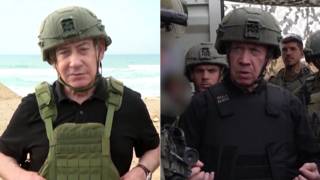

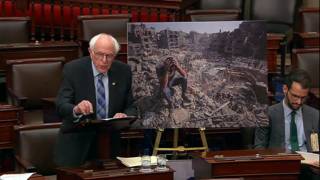
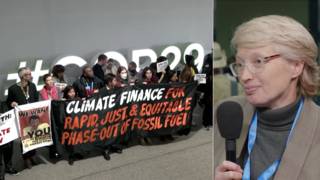




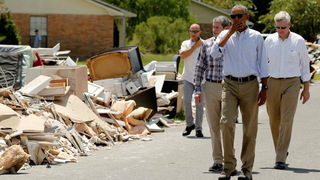
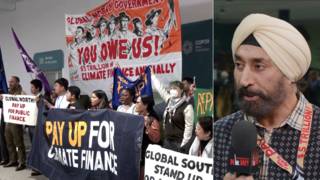
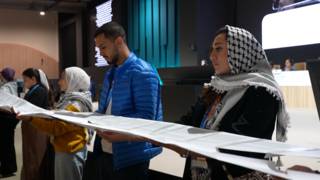
Media Options